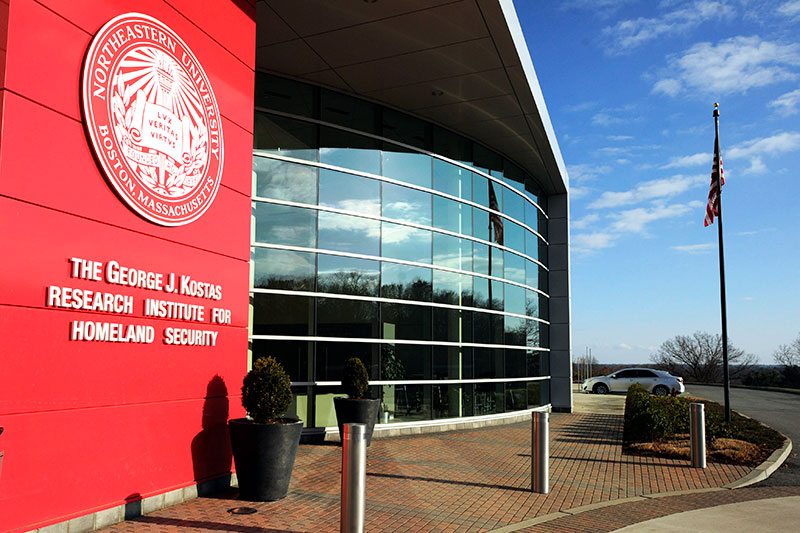
Research Centers & Institutes
The College of Engineering has 20 multidisciplinary research centers and institutes with funding by eight federal agencies (NIH, NSF, DHS, DOE, DHHS, EPA, NSA). You may also be interested in our recent Annual Reports for the college and each engineering department. View the faculty profiles to learn about faculty laboratory research efforts.
Federally-Designated Research Centers Led by Northeastern
The College of Engineering has a significant track record of leading federally-designated centers. Centers which have graduated from their federal funding, and centers for which the college is a partner, are listed below.
-

Designated by the National Institutes of Health as a Superfund Research Center, PROTECT studies exposure to environmental contamination in Puerto Rico and its contribution to preterm birth. PROTECT also seeks to better understand the phenomena affecting fate and transport of hazardous substances in aquifers and to develop green remediation strategies.
-

Designated a Center of Excellence by the Department of Homeland Security, SENTRY (Soft-target Engineering to Neutralize the Threat RealitY) addresses the many challenges of protecting soft targets and crowded places in our homeland.
Federally-Designated Research Centers Where Northeastern Is a Partner
-

Designated by the National Science Foundation as an NSF AI Institute, AI-EDGE leverages the synergies between networking and AI to design future generations of wireless edge networks.
-

Funded by the National Science Foundation as an Industry-University Cooperative Research Center, CHEST will coordinate university-based research with the needs of industry and government partners to advance knowledge of security, assurance, and trust for electronic hardware and embedded systems.
-

Funded by the National Science Foundation as a Predictive Intelligence for Pandemic Prevention Center, CPI aims to harness new technologies and develop sensing to detect, investigate, and ultimately prevent pandemics at their source.
-

Designated by the National Science Foundation as an Industry-University Cooperative Research Center, CEPS is advancing critical solid-state energy systems research and battery supply chain challenges for portable and medical applications, the automotive industry, centralized and decentralized electric grids, military applications, and energy security.
University Research Institutes and Centers
Northeastern institutes support interdisciplinary, cross-sector teams working on societal changes with wide-ranging applications to groups with a more singular focus. The College of Engineering leads four university institutes, partners with 10 more, and supports one college center.
-

INSI pioneers research in wireless systems and networks to make the next generation of internet of things a continuum of connected devices able to interact in new ways with people and the environment—from connected cars and drones, to implantable medical devices and smart communities.
-

IER focuses on the development of robots able to learn and adaptively execute autonomous behaviors from human partners and/or other robots.
-

The institute is a global hub focused on pioneering semiconductor research, learning, and innovation.
-

The institute accelerates mechanobiology discovery and technology to enhance human health and advance medicine. It is one of only a few in the world specifically dedicated to mechanobiology study and innovation.
-

The center was established to help manufacturers and industry experts navigate the operational hazards of cybersecurity implementation and prepare them for future challenges of FDA requirements.
-

CAMR will improve the resiliency of the U.S. through materials innovation, promote the translation of University research and technology to industry partners, and enhance academic offerings and workforce training in materials.
-

The center advances the frontiers of magnetic science and technology through interdisciplinary collaboration and innovation. Our center develops strong partnerships with industry, government laboratories, and leading magnetics programs worldwide to serve as a global hub for cutting-edge magnetics research.
-

The Plastics Center is a global leader in the fight against plastic pollution. By collaborating with partners from across Northeastern’s global network and institutions in the Global South, we work to drive research, contribute to global policy-making, and enhance sustainability worldwide.
-

Conducts fundamental and interdisciplinary applied research in the areas of computational modeling, computer vision, distributed computing, image analysis, machine learning, optimization, and signal processing.
COE Researchers Are Active in Northeastern Research Institutes
-

Developing and applying technologies for biopharmaceutical characterization and proteomics and systems biology.
-

Creating cleaner, safer, smarter coastal communities, using environmental sensing, predictive analytics, and other technology tools to reduce threats at the land-sea interface, including sea-level rise, collapsing fisheries, coastal pollution, and gaps in port security.
-

Forging partnerships with experts in industry, government, and academia worldwide, the Institute’s faculty and students develop, protect, and enhance technologies on which the world relies—from mobile devices and “smart” IoT applications to tomorrow’s self-driving cars and delivery drones.
-

The Dublin Innovation Institute facilitates groundbreaking research addressing global challenges through responsible technology and innovation, health and wellbeing, sustainability and climate action, AI and data science, and advanced manufacturing.
-

Fostering collaborative, use-inspired research aimed at expanding the capacity of communities, critical systems, and infrastructure to withstand, respond to, and recover from manmade and natural catastrophes.
-

Informing and advancing societal resilience around the world by partnering with other leading academic research institutions, nonprofits and the public and private sectors to devise and apply practical, interdisciplinary innovations and solutions to resilience challenges.
-

The true promise of AI lies at the intersection of humans and intelligent machines, helping each achieve what neither could alone and to transform society for the better. Northeastern’s Institute for Experiential AI advances this human-centered approach, enabling us to design, implement, and scale AI to help people reach greater productivity and creativity at work, lead healthier lives, and build stronger communities.
-

Protecting the integrity and security of information and reducing the vulnerability of hardware and software systems to attacks.
-

Developing the next-generation of quantum materials and sensing technology for impactful real-world applications.
-

Spurring innovation, building talent, and driving economic growth in Portland, the state of Maine, and the Northeast. Partnerships—with industry, academia, and government—set its research and education model apart.
Legacy Research Centers
Funding from federal agency has concluded.
 Academic Center for Reliability and Resilience of Offshore Wind (ARROW): Designated by the Department of Energy with additional support from the states of Maryland and Massachusetts, ARROW is a first-of-its-kind center of excellence on offshore wind. Academic Center for Reliability and Resilience of Offshore Wind (ARROW): Designated by the Department of Energy with additional support from the states of Maryland and Massachusetts, ARROW is a first-of-its-kind center of excellence on offshore wind. |
 Awareness and Localization of Explosives-Related Threats (ALERT): Designated as a Department of Homeland Security Center of Excellence, ALERT conducts transformational research focused on characterizing, detecting, mitigating, and responding to explosives-related threats. Awareness and Localization of Explosives-Related Threats (ALERT): Designated as a Department of Homeland Security Center of Excellence, ALERT conducts transformational research focused on characterizing, detecting, mitigating, and responding to explosives-related threats. |
 Bernard M. Gordon Center for Subsurface Sensing and Imaging Systems (Gordon-CenSSIS): Designated as a National Science Foundation Engineering Research Center, Gordon-CenSSIS focuses on revolutionizing the detection of biomedical and environmental objects or conditions that are underground, underwater, or embedded within cells or inside the human body. Bernard M. Gordon Center for Subsurface Sensing and Imaging Systems (Gordon-CenSSIS): Designated as a National Science Foundation Engineering Research Center, Gordon-CenSSIS focuses on revolutionizing the detection of biomedical and environmental objects or conditions that are underground, underwater, or embedded within cells or inside the human body. |
 Center for High-rate Nanomanufacturing (CHN): Designated by the National Science Foundation as a Nanotechnology Science and Engineering Center, CHN developed tools and processes to enable high-rate/high-volume bottom-up, precise assembly of nanoelements (such as carbon nanotubes and nanoparticles) and polymer nanostructures. Director: Ahmed Busnaina Center for High-rate Nanomanufacturing (CHN): Designated by the National Science Foundation as a Nanotechnology Science and Engineering Center, CHN developed tools and processes to enable high-rate/high-volume bottom-up, precise assembly of nanoelements (such as carbon nanotubes and nanoparticles) and polymer nanostructures. Director: Ahmed Busnaina |
 Center for Nano and Microcontamination Control: Designated by the National Science Foundation as an Industry-University Cooperative Research Center, CMC developed state-of-the-art cleaning techniques for computer microchips and creating micro-sensors that detect impurities in gases used in building semiconductors. Director: Ahmed Busnaina Center for Nano and Microcontamination Control: Designated by the National Science Foundation as an Industry-University Cooperative Research Center, CMC developed state-of-the-art cleaning techniques for computer microchips and creating micro-sensors that detect impurities in gases used in building semiconductors. Director: Ahmed Busnaina |
 Center for Research on Early Childhood Exposure and Development in Puerto Rico: Designated by the Environmental Protection Agency and National Institutes of Health as a Children’s Environmental Health Center, CRECE studies how mixtures of environmental exposures and other factors affect the health and development of infants and children living in the heavily-contaminated island of Puerto Rico. Director: Akram Alshawabkeh Center for Research on Early Childhood Exposure and Development in Puerto Rico: Designated by the Environmental Protection Agency and National Institutes of Health as a Children’s Environmental Health Center, CRECE studies how mixtures of environmental exposures and other factors affect the health and development of infants and children living in the heavily-contaminated island of Puerto Rico. Director: Akram Alshawabkeh |
 Center for Translational Applications of Nanoscale Multiferroic Systems (TANMS): Designated by the National Science Foundation as an Engineering Research Center TANMS works to engineer a revolution in miniature electromagnetic electronics through development of a new class of nanoscale multiferroic materials. Northeastern Director: Nian Sun Center for Translational Applications of Nanoscale Multiferroic Systems (TANMS): Designated by the National Science Foundation as an Engineering Research Center TANMS works to engineer a revolution in miniature electromagnetic electronics through development of a new class of nanoscale multiferroic materials. Northeastern Director: Nian Sun |
 Center for Ultra-wide-area Resilient Electric Energy Transmission Networks: Designated by the Department of Energy and National Science Foundation as an Engineering Research Center, CURENT’s research focuses on building a more reliable, secure and efficient electric grid transmission system that uses renewable energy sources. Northeastern Director: Ali Abur Center for Ultra-wide-area Resilient Electric Energy Transmission Networks: Designated by the Department of Energy and National Science Foundation as an Engineering Research Center, CURENT’s research focuses on building a more reliable, secure and efficient electric grid transmission system that uses renewable energy sources. Northeastern Director: Ali Abur |
 Healthcare Systems Engineering Institute (HSyE): Designated by the Department of Health and Human Services, HSyE embeds proven evidence-based industrial and systems engineering (ISE) improvement methods into local healthcare organizations, similar to as used in other complex industries. Director: James Benneyan Healthcare Systems Engineering Institute (HSyE): Designated by the Department of Health and Human Services, HSyE embeds proven evidence-based industrial and systems engineering (ISE) improvement methods into local healthcare organizations, similar to as used in other complex industries. Director: James Benneyan |